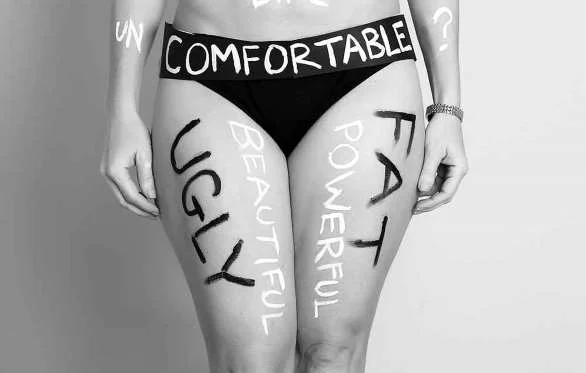Although most of my personal training clients look past this type of article, it provides the real answer to
sustainable weight loss. If you’ve been jumping from diet to diet or struggling with losing weight, maybe it’s time to open yourself to the real reasons why. I’ve carved out the top 5 reasons from the MSN article “10 Mistakes You're Making Every Time You Think About Starting A Diet.”
Photo Credit:
Prevention.com–What messages are you hearing while trying to lose weight?
Article Credit:
Author: Michael Moody Fitness with excerpt sourced from the article "10 Mistakes You're Making Every Time You Think About Starting A Diet" on MSN.com (Prevention).
Personal Trainer Wisdom: My all-or-nothing personal training clients always achieve the highest levels of weight loss success in the shortest amount of time….and eventually gain the weight back every time. Unfortunately, black-and-white thinking overlooks what’s emotionally, mentally, and physically best for you. With this being said, a non-adaptable drastic change will only lead to short term results.1. BLACK-AND-WHITE THINKING
Black-and-white thinking is probably the most common mistake I see among people who struggle with their weight. This mindset creates an all-or-nothing cycle that pushes you toward failure as soon as one single thing goes wrong. You step on the scale after a particularly austere week of sticking to your plan and discover you didn't lose an ounce—"That's it, I just can't lose any weight." But you can.
Black-and-white thinking is the mindset of habitual dieters because they constantly see themselves as being either on a diet—restricting themselves from foods they love—or off the diet—eating "forbidden foods" with relish. When you think in black and white, you get angry and tell yourself you screwed up royally (again). You're deflated and beating yourself up. You see losing weight as an impossible task and may even abandon your plan right then and there. You end up wallowing away the rest of the day with your head in the refrigerator and worrying what you're going to see when you find the nerve to step on the scale.
People who live in black-and-white thinking fail to consider that there are choices between all or nothing. They have a difficult time getting back on track when deviation happens. They view their day as ruined instead of accepting that one decision was just one mistake and it's time to forget about it and move forward. When repeated over time, this kind of thinking creates a consistent barrier to success.
Personal Trainer Wisdom: Quit being so dramatic! It isn’t entirely your fault though. You’re surrounded by negativity in the news, film, and family parties, and it rubs off on you. It’s no wonder every little thing that goes wrong seems to compound on itself! If you really break down the stream of life (and your thoughts), you’ll see that more things end up better than worse (we just tend to overlook these little successes). Accept the imperfections of life and be mindful of your emotional reaction to the small challenges along the way. All of us make mistakes. Accept that and continue to identify these patterns before they become more destructive.2. OVERGENERALIZATION
People with this mindset see a single negative event as a never-ending pattern of defeat. It's the continuation of black-and-white thinking—a small misstep is turned into a blown-out-of-proportion event.
"Not only did I order the wrong thing," you tell yourself, "but it happens every single time I go out for breakfast. What's wrong with me? Eating out is just not possible for me." You work yourself into such a tizzy over it, you start to question your self-worth: "I'll never get to where I want to be." You abandon your diet, thinking, "What's the point?" until the next time you muster up the courage to start dieting again. Overgeneralization is a sure way to mentally talk yourself into failure.
Personal Trainer Wisdom: It’s easy to obsess over any criticism in your efforts (or obsession) to be perfect. If you find yourself emotionally reacting to a comment, ask the person to clarify (to understand his or her intent) and/or personally write a list of reasons why the statement is untrue.3. MENTAL FILTERING
You've lost 15 pounds, and people are noticing. Your officemates are smothering you with compliments: "You look great!" "That new outfit really shows off your slimmer figure." Then you meet your mother for lunch, and she says, "You're looking tired. I thought you were working on losing weight and improving your health. How's that going?"
Forget the 20 compliments you heard that morning. All you can think about is the fact that your mother hasn't noticed what the people in your office are seeing. This is mental filtering. You pick out a single negative detail and dwell on it exclusively, to the point where it darkens your vision of reality. You mope through lunch, all the while feeling self-conscious about the way you look. Your mind is not on the compliments or your lunch. It's on your weight, as you mindlessly eat your way through the breadbasket.
In reality, perhaps your mother really did think you looked tired because she's worried that you're working too hard and not getting enough sleep. Maybe she didn't notice your weight loss because she's concerned about the strained look on your face. On the outside chance she ignored your improved figure out of a little jealousy, one left-out compliment should not negate the multitude of encouragement you heard all morning.
Personal Trainer Wisdom: My personal training clients, as well as myself, have been guilty of these disqualifying reactions. I flipped the switch by celebrating every positive response with genuine appreciation. I wouldn’t be truthful if I said it was easy at first. Ultimately, you need to reinforce positive messages WITHIN you before you accept positive messages OUTSIDE of you. Surround yourself with brainwashing quotes on your mirror, phone, and wall to reinforce a new, open mindset.4. DISQUALIFYING THE POSITIVE
Let's get back to those compliments from your coworkers. When you disqualify the positive, it means you're just not buying it. You think what your coworkers are telling you is not really true—they are just saying it to be nice. You think, "I'm still overweight, and they know it."
Some people who are overweight have such a poor self-image that they can't see themselves in anything but the negative. If you struggle with your self-worth, this cognitive distortion could be a major contributor to your negative thinking pattern. You may have trouble viewing yourself in anything but a negative vision, so when someone does pay you a compliment, you immediately dismiss it as untrue. You discount positive experiences by telling yourself that they "don't count." You put yourself in a mind rut so deep you live in a negative shadow that is contradictory to your everyday experiences. When people feel bad about themselves, they make bad food choices.
Personal Trainer Wisdom: Be aware of your mindset and the underlying influences on your behavior and perspective. Are you looking for the worst or negative in people and your environment? What negative filter are you viewing the world? Is it self-imposed? Although personal trainers will sell the physical side, the real change for sustainable weight loss is a result of your emotional and mental rewiring efforts. It’s time to change your mind and redefine your interaction with the world and the way you perceive yourself.5. JUMPING TO CONCLUSIONS
An attractively dressed woman stares at you at the grocery store, and you think, "Why is she looking at me that way? I must look horrible." That's jumping to a conclusion. This mindset constantly interprets every experience as a negative without any evidence to support the conclusion. There are no facts, no fact-checking. You constantly make assumptions about yourself: "She's staring at me because she thinks I'm a slob," even if it's more likely that she's staring at you because she thinks she recognizes you from somewhere and can't put her finger on it.
People who jump to conclusions don't see themselves as others see them. They think others see them as they see themselves—and for those lacking confidence about their appearance, it is not in a flattering way.
When you're in this mindset, you can jump to conclusions about anything, without any evidence whatsoever—"Why is he staring at my double chin while he's talking to me?" when he's actually looking you in the eye. Worse yet, you tend to play fortune teller, anticipating that something or an event will turn out badly, thereby helping to make it a foregone conclusion: "I just know I'm going to eat too much and all the wrong stuff at the party tonight."
Photo Credit:
Prevention.com–What messages are you hearing while trying to lose weight?
Article Credit:
Author: Michael Moody Fitness with excerpt sourced from the article "10 Mistakes You're Making Every Time You Think About Starting A Diet" on MSN.com (Prevention).































